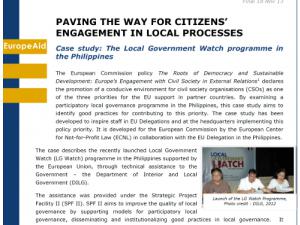How to strengthen the involvement of civil society in public life? Three new case studies from EuropeAid illustrate good practice from three different corners of the world.
Enhancing efforts to promote an environment conducive to civil society organisations (CSOs) in partner countries is one of the three main priorities of the “Civil Society” Communication adopted by the European Commission in September 2012.
Promoting a conducive environment can involve many different aspects. In some countries the issues concern fundamental rights and freedoms, such as whether CSOs have the right to freedom of assembly. Elsewhere the key challenges may be access to information – in law and in practice.

“It’s one thing to agree that you will provide access to information, another thing is actually to put all that in an appropriate quality format, accessible for the citizens,” says Thomas Hansen, a programme manager at EuropeAid. “This is a large, complicated, technical process where technical assistance is often required.”
It matters, for example, whether a CSO receives budgetary information on a scanned piece of paper or in the form of an editable excel sheet. Making information available in editable formats “would allow civil society much more to play an active ‘oversight’ role. It is about increasing the accountability dimension of civil society, which we seek to promote.”
Other important aspects of the legal and regulatory environment include legal requirements for parliament to consult broadly when drafting new laws, and the existence of forums to debate budget processes.
Three new case studies from the Civil Society and Local Authorities Unit in EuropeAid shed light on another important aspect of the enabling environment: Promoting strategies for cooperation between authorities and civil society at national and local level.
The Former Yugoslav Republic of Macedonia was one of the first countries in the western Balkans to adopt a four-year strategy for cooperation with CSOs in 2007. However, there was little funding and no mechanism for consultations. When a second generation strategy was adopted for the period 2012-2017 it was based on genuine participation. CSOs were selected through an open call based on pre-defined criteria, all draft documents were available on the government’s website, and European and local expertise was engaged.
In the Philippines the Local Government Watch (LG Watch) programme – supported by the European Union – was introduced to fight corruption and rebuild trust in public institutions. Components of LG Watch include a Citizens Satisfaction Index System, Civil Society Participation Fund, and capacity development and training, all of which are supported by an information communication technology (ICT) system that reports results back to government, CSOs and other users. This initiative reflects the importance of “institutionalising” citizens’ participation.
And in Iraq, two parallel processes have been launched (one in the Kurdistan region, and another at the federal level) to strengthen the involvement of CSOs in public life. The case study found that the success of both processes so far was due to the following elements:
- Ownership: Drafting groups taking part in knowledge sharing sessions helped build consensus and respond to local needs.
- Participation: Consultations were facilitated by local leaders selected through agreed criteria and trained by the EU.
- Experience exchange: Lessons learned during the preparations in Kurdistan were passed on to assist in the federal process.
- Awareness-raising: The media and parliamentarians were kept informed to garner the necessary support.
- European and region-specific expertise: Participants were exposed to direct examples from European countries as well as regional experiences to build trust and confidence.
Overall, Mr Hansen says that the increasing use of ICT systems has been a “game changer” for civil society organisations.
“How can you as a CSO collect data on an incredibly large scale very rapidly, to show client satisfaction with how the local health clinics are performing? You can have lots of data if you use mobile handsets and put this data together, aggregate it and put it back for dialogue with authorities. This is a very powerful tool and I think the spread of mobile handsets in sub-Saharan Africa for example, has meant that civil society can play a much more powerful advocacy role.”
The three case studies:
- Opening Space for Equal Partnership
- Pioneering New Forms of Cooperation between Public Authorities and Civil Society
- Paving the Way for Citizens' Engagement in Local Processes
are available on the Public Group on Civil Society on capacity4dev.eu.
This collaborative piece was drafted with input from Thomas Hansen and support from the capacity4dev.eu Coordination Team. Teaser image courtesy of the Asian Development Bank.

Log in with your EU Login account to post or comment on the platform.